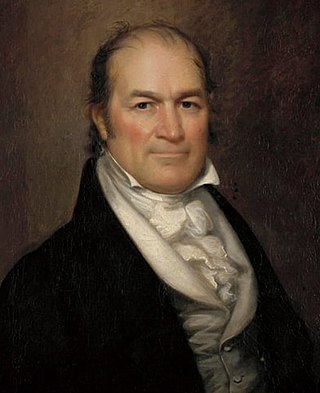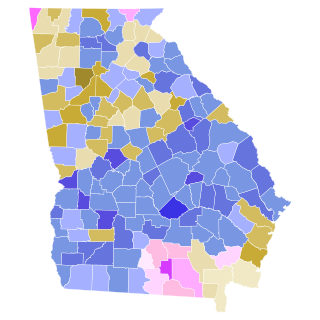
Presidential elections were held in the United States from October 31 to December 2, 1828. Just as in the 1824 election, President John Quincy Adams of the National Republican Party faced Andrew Jackson of the Democratic Party, making the election the second rematch in presidential history. Both parties were new organizations, and this was the first presidential election their nominees contested.

Presidential elections were held in the United States on November 2, 1852. Democratic nominee Franklin Pierce defeated Whig nominee General Winfield Scott.

William Harris Crawford was an American politician and judge during the early 19th century. He served as US Secretary of War and US Secretary of the Treasury before he ran for US president in the 1824 election.

John Davis Long was an American lawyer, politician, and writer from Massachusetts. He was the 32nd governor of Massachusetts, serving from 1880 to 1883. He later served as the Secretary of the Navy from 1897 to 1902, a period that included the primarily naval Spanish–American War.

The 1882 South Carolina gubernatorial election was held on November 7, 1882 to select the governor of the state of South Carolina. Hugh Smith Thompson was nominated by the Democrats and ran against J. Hendrix McLane, a Greenback-Labor candidate. Thompson easily won the general election and became the 81st governor of South Carolina.

The 1824 United States presidential election in Georgia took place on November 1, 1824, as part of the 1824 United States presidential election. The Georgia General Assembly chose 9 representatives, or electors to the Electoral College, who voted for President and Vice President.

The 1828 United States presidential election in Georgia took place on November 3, 1828, as part of the 1828 United States presidential election. Georgia voters chose 9 electors to the Electoral College, who voted for president and vice president.

The 1832 United States presidential election in Georgia took place on November 5, 1832, as part of the 1832 United States presidential election. Voters chose 11 representatives, or electors to the Electoral College, who voted for President and Vice President.

The 1836 United States presidential election in Georgia took place between November 3 and December 7, 1836, as part of the 1836 United States presidential election. Voters chose 11 representatives, or electors to the Electoral College, who voted for president and vice president.

The 1946 Georgia gubernatorial election took place on November 5, 1946, in order to elect the governor of Georgia.

The 1878 Massachusetts gubernatorial election was held on November 5. Former acting Governor Thomas Talbot, a Republican, defeated Benjamin Butler, who ran as an independent Greenback candidate with Democratic support. Butler's supporters secured a majority of delegates to the Democratic state convention, but his nomination was rejected by the state party committee after his supporters used violent tactics to exclude anti-Butler delegates from the convention hall.

The 1836 Massachusetts gubernatorial election was held on November 14.

The 1828 Indiana gubernatorial election took place on August 4, 1828 under the provisions of the Constitution of Indiana. It was the fifth gubernatorial election in the State of Indiana. James B. Ray, the incumbent governor, was re-elected, defeating Israel T. Canby, the former state senator representing Jefferson and Jennings counties, and Harbin H. Moore, the outgoing speaker of the Indiana House of Representatives, in a three-way race. The election took place concurrently with races for lieutenant governor and members of the Indiana General Assembly.

The 1825 Georgia gubernatorial election was held on October 3, 1825, to elect the governor of Georgia. It was the first popular election for governor in Georgia's history following its adoption by the Georgia General Assembly a year prior.

The 1829 Georgia gubernatorial election was held on October 5, 1829, to elect the governor of Georgia. Jacksonian Troup Governor John Forsyth, first elected in the 1827 election, declined to seek re-election to a second term, instead aiming to be elected to the U.S. Senate. Jacksonian Troup candidate George Rockingham Gilmer, U.S House rep for Georgia's 1st congressional district, won in a landslide with the backing of both local parties.

The 1831 Georgia gubernatorial election was held on October 3, 1894, to elect the governor of Georgia. Incumbent Jacksonian Troup Governor George Rockingham Gilmer, first elected in the 1829 election, ran for re-election to a second term. He was narrowly defeated by the Jacksonian Union nominee, U.S House Representative Wilson Lumpkin.

The 1833 Georgia gubernatorial election was held on October 7, 1833, to elect the governor of Georgia. Incumbent Democratic Union Governor Wilson Lumpkin narrowly defeated National Republican Troup nominee Joel Crawford

The 1823 Georgia gubernatorial election was held on 7 November 1823 in order to elect the Governor of Georgia. Democratic-Republican candidate and former United States Senator for Georgia George Troup narrowly defeated fellow Democratic-Republican candidate and former acting Governor Matthew Talbot in a Georgia General Assembly vote.

A legislatively referred referendum on whether the US state of Georgia should adopt the popular election of presidential electors was held on October 5, 1824, concurrently with legislative elections to the general assembly. The proposal received substantial support with 70.92% of voters supporting the change.
The Troup party, earlier called the Jackson and Crawford parties after its leaders, was a political faction in the state of Georiga aligning itself with the radicals of the Democratic-Republican Party and later the Jacksonians. Founded by James Jackson, the faction consisted of Virginian immigrants, aristocratic plantation owners, residents of the more prosperous and populated areas of the state. The faction opposed the local Federalist Party and the Clark party—a rival faction of Republicans led by John Clark.




















